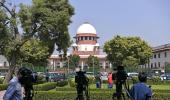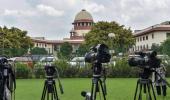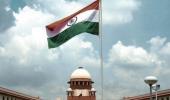The development of constitutional jurisprudence would virtually come to a standstill if the apex court is "denuded" of its power to reconsider its decisions, the Supreme Court said on Monday.

In its landmark verdict which held that MPs and MLAs taking bribe to vote or make a speech in the House are not immune from prosecution, the apex court said its ability to reconsider its decisions was necessary for the organic development of law and the advancement of justice. The apex court verdict overturned the 1998 judgment of the court in the JMM bribery case.
A seven-judge Constitution bench headed by Chief Justice D Y Chandrachud said the doctrine of stare decisis, which says court should not lightly dissent from precedent, is not an "inflexible rule of law".
"The ability of this court to reconsider its decisions is necessary for the organic development of law and the advancement of justice. If this court is denuded of its power to reconsider its decisions, the development of constitutional jurisprudence would virtually come to a standstill," the bench said in its 135-page verdict.
It said in the past, the top court has not refrained from reconsidering a prior construction of the Constitution if it proves to be unsound, unworkable or contrary to public interest.
"This court may review its earlier decisions if it believes that there is an error, or the effect of the decision would harm the interests of the public or if 'it is inconsistent with the legal philosophy of the Constitution'," said the bench, which also comprised Justices A S Bopanna, M M Sundresh, P S Narasimha, J B Pardiwala, Sanjay Kumar and Manoj Misra.
It said in cases involving the interpretation of the Constitution, the apex court would do so more readily than in other branches of law because not rectifying a manifest error would be harmful to public interest and the polity.
"The period of time over which the case has held the field is not of primary consequence. This court has overruled decisions which involve the interpretation of the Constitution despite the fact that they have held the field for long periods of time when they offend the spirit of the Constitution," it said.
The bench dealt with the preliminary objection raised before it regarding reconsidering the decision in the 1998 verdict in the P V Narasimha Rao versus CBI case, also known as JMM bribery scandal.
In 1998, by a majority of 3:2, a five-judge bench in the P V Narasimha Rao versus CBI case had granted immunity from prosecution to a member of Parliament or legislature who has engaged in bribery for casting a vote or speaking in house under Articles 105(2) and 194(2).
The seven-judge bench said a decision delivered by a bench of larger strength is binding on any subsequent bench of lesser or coequal strength and a bench of lesser strength cannot disagree with or dissent from the view of the law taken by the bench of larger strength.
"However, a bench of the same strength can question the correctness of a decision rendered by a co-ordinate bench. In such situations, the case is placed before a bench of larger strength," it noted.
The bench said in consonance with judicial discipline, the correctness of the 1998 verdict was only doubted by the co-equal bench of five judges in a detailed order.
It noted that doubts about the correctness of the 1998 verdict have been raised by the apex court in several previous decisions as well.
The bench said counsel appearing for the appellant had argued that a position of law which has stood undisturbed since 1998 should not be interfered with by the court.
"We do not consider it appropriate for this court to confine itself to such a rigid understanding of the doctrine of stare decisis," it said.
The bench said the majority verdict in the 1998 case deals with an important question of constitutional interpretation which impacts probity in public life.
"The decision has been met with notes of discord by various benches of this court ever since it was delivered in 1998. An occasion has arisen in this case to lay down the law and resolve the dissonance. This is not an instance of this court lightly transgressing from precedent," it said.
"In fact, this case is an example of the court giving due deference to the rule of precedent and refraining from reconsidering the decision in PV Narasimha Rao until it arose squarely for consideration," the bench said.
It noted the decision in the 1998 case has wide ramifications on public interest, probity in public life and the functioning of parliamentary democracy.
"The majority judgment contains several apparent errors inter alia in its interpretation of the text of Article 105; its conceptualisation of the scope and purpose of parliamentary privilege and its approach to international jurisprudence all of which have resulted in a paradoxical outcome," the bench said.
"The present case is one where there is an imminent threat of this court allowing an error to be perpetuated if the decision in PV Narasimha Rao is not reconsidered," it said.
Referring to a concurring opinion of the United States Supreme Court while overruling its two previous decisions on a question of constitutional importance, the bench noted, "The above formulation holds true for the Constitution of India as well, which is a transformative document that raises delicate issues of constitutional interpretation."
"We believe that we must not perpetuate a mistaken interpretation of the Constitution, merely because of rigid allegiance to a previous opinion of five judges of this court," it said.











 © 2025
© 2025